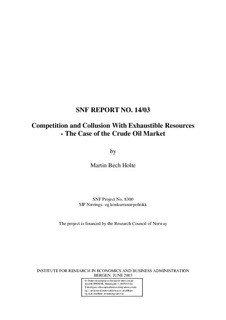| dc.contributor.author | Holte, Martin Bech | |
| dc.date.accessioned | 2006-06-23T10:11:15Z | |
| dc.date.available | 2006-06-23T10:11:15Z | |
| dc.date.issued | 2003-06 | |
| dc.identifier.isbn | 82-491-0270-3 (trykt versjon) | |
| dc.identifier.issn | 0803-4036 | |
| dc.identifier.uri | http://hdl.handle.net/11250/164561 | |
| dc.description.abstract | In this thesis I analyze the dynamics of competition and collusion in exhaustible resource markets, with a special focus on the market for crude oil. Theoretical models with perfect competition, monopoly, and Cournot duopoly are developed and illustrated. Theory of collusion is then considered, and I discuss how exhaustibility affects the possibility of collusion. It is shown that small reserve holders only will find it profitable to join a cartel if the quotas are allocated in favor of the small reserve holders. In the latter parts of the paper I show how risk aversion and the recent weakness of Saudi Arabia affect best-response strategies, and how an increase in risk aversion might promote cartel stability when quota allocation is based on production capacity. Throughout the paper I confront the theories with actual data. | en |
| dc.format.extent | 720633 bytes | |
| dc.format.mimetype | application/pdf | |
| dc.language.iso | eng | en |
| dc.publisher | SNF | en |
| dc.relation.ispartofseries | Report | en |
| dc.relation.ispartofseries | 2003:14 | en |
| dc.title | Competition and collusion with exhaustible resources : the case of the crude oil market | en |
| dc.type | Research report | en |
